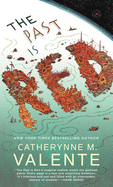
I approached The Past is Red with gallons of glee and a drop of trepidation. Plenty of books disappoint me, even ones written by my favorite authors. I am happy to report The Past is Red is the hopepunk tale of the apocalypse I have been waiting for. Reading it felt like seeing my name up in lights on a marquee—surreal and marvelous. It filled me with warm feelings for humanity at large because if our narrator Tetley, someone with plenty of pain in her life, can love the future, so can I.
The Past is Red begins with Catherynne M. Valente’s novelette “The Future is Blue” and expands the story of the narrator. In Part I, Tetley Abednego is the most optimistic girl in Garbagetown. Despite living on a floating garbage heap in the ocean centuries after the oceans rose high enough to swallow all dry land on Earth, Tetley finds beauty and hope all around her. Her best friends are an elephant seal named Big Bargains, a gannet bird called Grapecrush, and her twin brother Maruchan. She finds solace in her savior St. Oscar the Grouch. When the mobile theme park Brighton Pier arrives in town with news of dry land, all of Garbagetown prepares to turn on their engine to get there—a journey that will use all of the electricity that powers the town. When Tetley discovers a terrible secret, she makes a choice that turns her into the most hated girl in Garbagetown, and she learns the brutal lesson that no good deed goes unpunished.
In Part II, Tetley is some years older, and still suffering the consequences of her choice. She’s also still the most optimistic girl in Garbagetown, albeit one who lives on a boat circling the garbage heap. Told in alternating timelines, Tetley recounts how she made the choice to flee her punishment only to end up tricked into being the wife of a self-proclaimed king for thirteen whole days. Along the way she makes the acquaintance of a mysterious talking machine she calls Mister and the girl Big Red Mars, the only person to never hate her. What unfolds is beautiful, tragic, and wondrous.
It is unusual to find a bright and bubbly narrator in Valente’s work, which is part of what makes Tetley’s voice so thrilling. Longtime fans and newcomers will find Valente at her best, relishing in elaborate sentences packed with imagery that sort of make you want to visit Garbagetown despite it being the result of decadence and apathy towards the climate crisis left behind by the Fuckwits (that’s you and me, dear reader). I want to pull the tangled string of baby dolls so they wail at me like “the death of joy” as saltwater pours from their mouths, which I like to imagine arcs in high-order Bézier curves reminiscent of a fountain. I want to visit Tetley in her house made of wax candles and compliment her on her moringa tree. Then I want to go home. Of course, the tragedy of Garbagetown is that you can’t visit. Once you’re there, you’re stuck. You’re stuck among a group of humans with a concept of happiness so narrow that they would rather be told a lie they know is a lie than process the truth because a lie is so much easier to live with.
Much of the tension in the novel comes from the inability of others to understand Tetley. Why is she so happy when everyone wants her to be miserable? Why does she love Garbagetown when everyone else wants to leave?
It’s true that optimism can sometimes be insufferable, but our girl Tetley does not engage in toxic positivity. She very much understands the sorry state of the world, but still appreciates humanity’s innate goal, that North Star guiding every one of us: survival.
In her afterword, Valente writes, “The oceans can erase our cities, but they cannot drown our existential malaise.” I agree with Valente’s point here. It is easy and even comforting to be defeatist about humanity’s existence, to want someone else to call the shots. That’s why people like Tetley are necessary to help us progress. We are going to survive whether we like it or not. Yet to move forward, to change, to make things right, we need someone to tell us the truths we do not want to hear.
As for why Tetley has so much hope, consider this. The citizens of Garbagetown may live on a hideous trash heap, but what a miracle it is that they still live, worship, and love. It is with great pleasure I assure you this view of the apocalypse does not come with roving gangs of cannibals. Grimdark can launch itself to Mars in Tetley’s world.
If you want a soundtrack to accompany this brilliant book, fire up David Bowie’s Scary Monsters (and Super Creeps). There’s a reference to the track “Ashes to Ashes” in chapter 4, and the album encapsulates the tone of the book perfectly.
 Jazz Sexton is a stay-at-home daughter taking care of her parents and working on a novel. She received her BA in English with a Certificate in Children’s Literature from the University of Pittsburgh, and her Certificate in Publishing from NYU. You can find her poetry in inkscrawl, Liminality, and Stone Telling.
Jazz Sexton is a stay-at-home daughter taking care of her parents and working on a novel. She received her BA in English with a Certificate in Children’s Literature from the University of Pittsburgh, and her Certificate in Publishing from NYU. You can find her poetry in inkscrawl, Liminality, and Stone Telling.







Connect with the Sirens community
Sign up for the Sirens newsletter